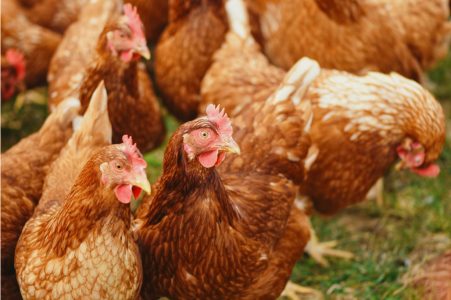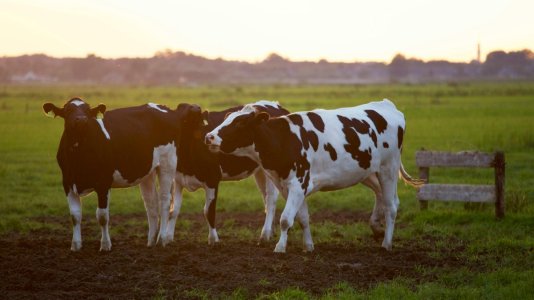California declares state of emergency: Is the bird flu threat at your doorstep?
By
Aubrey Razon
- Replies 0
California has declared a state of emergency as bird flu spreads rapidly. The virus is now affecting both animals and humans, sparking fears of a wider outbreak.
Here's what you need to know to protect yourself and your loved ones.
The H5N1 strain of bird flu was first detected in US dairy cattle in March and has since been confirmed in at least 866 herds across 16 states.
The impact on California's dairy industry is particularly significant, with approximately three-quarters of all affected US dairy herds located in the state.
The virus has also been found in Southern California dairy farms, having spread from the Central Valley since August.

Human infections have been mostly mild, with over 60 cases reported in eight states.
However, a severe case in Louisiana has heightened concerns.
The patient, an individual over 65 with underlying health conditions, contracted the virus after exposure to a backyard flock of sick birds.
This case marks the first confirmed U.S. infection tied to backyard birds and the first severe illness caused by the virus in the nation.
Despite the emergency declaration, the Centers for Disease Control and Prevention (CDC) maintains that the risk to the general public remains low.
There have been no reports of person-to-person transmission, and the virus has not shown signs of mutating to spread more easily among humans.
However, experts remain vigilant, as flu viruses are known for their ability to change rapidly.
For those in close contact with dairy cows, commercial poultry, or backyard birds, the risk is higher.
The CDC recommends taking precautions such as wearing respiratory and eye protection, gloves, and ensuring proper hygiene when handling animals.
If birds appear ill or die, it's crucial to handle them with care to prevent transmission.
The CDC has also advocated for flu vaccinations for farmworkers to reduce the risk of co-infection with seasonal flu, which could allow the bird flu virus to mutate.
Additionally, farmworkers exposed to infected animals should be tested and offered antiviral drugs, even if asymptomatic.
Beyond direct contact with animals, the H5N1 virus can spread through raw milk.
While pasteurized milk is safe due to the heat treatment that kills the virus, unpasteurized milk poses a risk.
High levels of the virus have been found in raw milk, leading to recalls in California.
In Los Angeles, two indoor cats fed recalled raw milk died from bird flu infections, and health officials are investigating further reports of sick cats.
The U.S. Agriculture Department has increased testing of raw milk nationwide to detect and contain the outbreak. A federal order now requires testing in 13 states.
As the situation evolves, staying informed is key. The GrayVine is committed to providing updates and guidance on how to navigate this health emergency. We encourage our readers to:
 Have you or someone you know been affected by the bird flu outbreak? Do you have concerns or questions about how to stay safe? Share your experiences and thoughts in the comments below.
Have you or someone you know been affected by the bird flu outbreak? Do you have concerns or questions about how to stay safe? Share your experiences and thoughts in the comments below.
Here's what you need to know to protect yourself and your loved ones.
The H5N1 strain of bird flu was first detected in US dairy cattle in March and has since been confirmed in at least 866 herds across 16 states.
The impact on California's dairy industry is particularly significant, with approximately three-quarters of all affected US dairy herds located in the state.
The virus has also been found in Southern California dairy farms, having spread from the Central Valley since August.

California has declared a state of emergency due to the spread of bird flu impacting dairy herds. Image source: Alexas Fotos/Pexels.
Human infections have been mostly mild, with over 60 cases reported in eight states.
However, a severe case in Louisiana has heightened concerns.
The patient, an individual over 65 with underlying health conditions, contracted the virus after exposure to a backyard flock of sick birds.
This case marks the first confirmed U.S. infection tied to backyard birds and the first severe illness caused by the virus in the nation.
Despite the emergency declaration, the Centers for Disease Control and Prevention (CDC) maintains that the risk to the general public remains low.
There have been no reports of person-to-person transmission, and the virus has not shown signs of mutating to spread more easily among humans.
However, experts remain vigilant, as flu viruses are known for their ability to change rapidly.
For those in close contact with dairy cows, commercial poultry, or backyard birds, the risk is higher.
The CDC recommends taking precautions such as wearing respiratory and eye protection, gloves, and ensuring proper hygiene when handling animals.
If birds appear ill or die, it's crucial to handle them with care to prevent transmission.
The CDC has also advocated for flu vaccinations for farmworkers to reduce the risk of co-infection with seasonal flu, which could allow the bird flu virus to mutate.
Additionally, farmworkers exposed to infected animals should be tested and offered antiviral drugs, even if asymptomatic.
Beyond direct contact with animals, the H5N1 virus can spread through raw milk.
While pasteurized milk is safe due to the heat treatment that kills the virus, unpasteurized milk poses a risk.
High levels of the virus have been found in raw milk, leading to recalls in California.
In Los Angeles, two indoor cats fed recalled raw milk died from bird flu infections, and health officials are investigating further reports of sick cats.
The U.S. Agriculture Department has increased testing of raw milk nationwide to detect and contain the outbreak. A federal order now requires testing in 13 states.
As the situation evolves, staying informed is key. The GrayVine is committed to providing updates and guidance on how to navigate this health emergency. We encourage our readers to:
- Follow local health advisories and updates from reputable sources.
- Practice good hygiene and take recommended precautions if in contact with potential sources of the virus.
- Consider getting vaccinated against seasonal flu to reduce the risk of co-infection.
- Avoid consuming raw milk and ensure that dairy products are pasteurized.
Key Takeaways
- California has declared a state of emergency due to the spread of bird flu impacting dairy herds and causing illnesses in people.
- The H5N1 bird flu virus has been confirmed in 866 herds across 16 states, with over 60 human infections reported, mostly mild.
- Officials emphasize the low risk to the general public, with no reports of person-to-person transmission and no indication the virus has mutated for easier human spread.
- People in contact with dairy cows, poultry, or backyard birds are advised to take precautions, and raw milk has been recalled due to virus detection.







